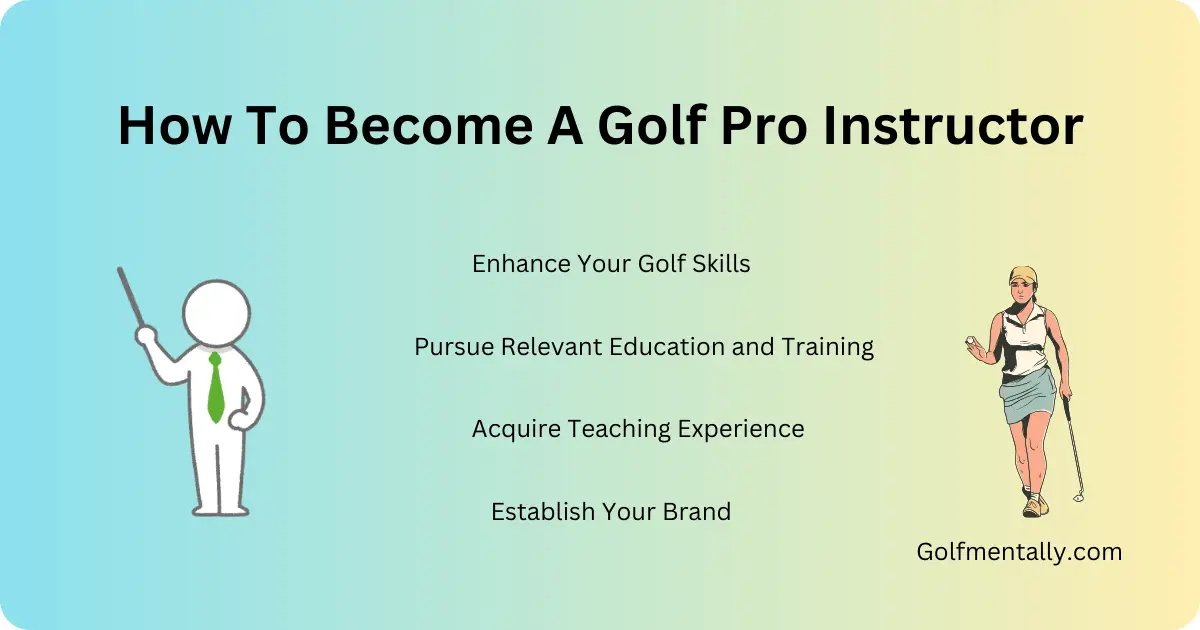Suppose you have a passion for golf and want to share that enthusiasm with others. In that case, you might be curious about how to become a golf pro instructor. This rewarding career allows you to blend your golf expertise with teaching, helping players enhance their skills and enjoy the game you love. In this blog post, we will discuss the key steps and requirements to embark on a successful journey as a golf instructor, along with valuable insights and practical tips to thrive in this profession.
Understanding the Role of a Golf Pro Instructor
Before we delve into the steps, it’s essential to clarify the responsibilities of a golf pro instructor. Instructors teach the game’s fundamentals—such as swing mechanics, putting techniques, and course strategy—and mentor players on mental toughness and motivation. This role necessitates strong communication skills and a comprehensive understanding of golf.
Enhance Your Golf Skills
The first step to becoming a golf pro instructor is to refine your golf skills. While you don’t need to be a professional player, having a solid foundation in the game is essential.
Here are some effective strategies for skill enhancement:
- Regular Practice: Spend ample time at the driving range, focusing on your driving, chipping, and putting abilities.
- Participate in Competitions: Engage in local tournaments or leagues to challenge yourself and gain valuable experience.
- Accept Feedback: Work with a seasoned instructor who can provide constructive criticism on your technique and areas for growth.
Pursue Relevant Education and Training
Although a formal degree is not a prerequisite for becoming a golf pro instructor, obtaining proper training can significantly enhance credibility.
Consider these educational avenues:
- PGA Membership: The Professional Golfers’ Association (PGA) provides a membership program that includes comprehensive training and certification. Completing this program can open up many professional opportunities.
- Golf Instruction Courses: Look for courses offered by various institutions focusing on teaching golf. These courses can equip you with practical teaching methodologies.
- Workshops and Seminars: Attend educational workshops to stay informed about the latest trends and techniques in golf instruction.
Acquire Teaching Experience
Once you’ve sharpened your skills and completed relevant training, it’s time to gain teaching experience.
Here’s how to get started:
- Start with Friends and Family: Offer to give lessons to friends or family members so you can practice your teaching style in a comfortable setting.
- Volunteer: Seek opportunities at local golf courses, schools, or community centres to gain hands-on experience.
- Apply for Positions: To gain professional experience, look for job openings at golf schools, country clubs, or sports academies.
Establish Your Brand
In the competitive field of golf instruction, having a strong personal brand can help you stand out.
Here are some strategies for building your brand:
- Develop an Online Presence: Use social media platforms to share instructional content, tips, and insights about golf. Engage with your audience to foster a community.
- Network: Attend golf tournaments and industry events to build connections with other professionals, which can lead to opportunities and referrals.
- Gather Testimonials: Encourage your students to provide feedback and testimonials. Positive reviews can significantly enhance your professional reputation.
Commit to Ongoing Education and Certification
The golf industry continually evolves, and staying current with new techniques and trends is essential.
To keep your skills relevant:
- Participate in Workshops: Engage in ongoing education through workshops and training sessions focused on the latest developments in golf instruction.
- Pursue Additional Certifications: Consider earning certifications from recognized organizations to bolster your qualifications.
Conclusion
Embarking to become a golf pro instructor is fulfilling and challenging. It requires dedication, skill, and a commitment to teaching. By following these steps and continually improving your skills and teaching methods, you’ll be well-equipped for a successful career. Remember, the journey of how to become a golf pro instructor not only enhances your own game but also allows you to inspire and guide others in their golfing pursuits. Embrace this exciting challenge and enjoy every moment spent on the course!
FAQs
What qualifications do I need to become a golf instructor?
To become a golf instructor, you typically need strong golf skills, relevant training, and possibly certification from organizations like the PGA.
How long does it take to become a golf pro instructor?
The timeline can vary; gaining skills and experience may take several years, while certification programs can often be completed in 1-2 years.
Do I need to be a great golfer to teach?
While you don’t need to be a professional golfer, having a solid understanding of the game and its mechanics is essential.
What skills are essential for a golf instructor?
Key skills include communication, patience, instructional ability, and a thorough understanding of golf techniques.
Can I teach golf without certification?
Yes, you can teach golf without formal certification, but being certified can enhance your credibility and attract more students.
Where can I find golf instructor training programs?
Programs are offered at golf academies, universities, and through organizations like the PGA.
What is the average salary of a golf pro instructor?
Salaries vary widely based on location and experience. Still, many instructors earn between $30,000 and $70,000 per year, with potential for more at prestigious clubs.
Is it necessary to have teaching experience before becoming a golf instructor?
While not strictly necessary, prior teaching experience can be very beneficial for developing effective instructional techniques.
What are some common challenges faced by golf instructors?
Common challenges include varying student skill levels, keeping students motivated, and managing business aspects like marketing and scheduling.
How can I market myself as a golf instructor?
Building an online presence, networking, offering free workshops, and gathering student testimonials are effective ways to market yourself.

James Smith is the author of a website called Golf Mentally. He believes that golf is as much about thinking as it is about swinging the club.
Golf Mentally helps golfers of all levels. It teaches new golfers the basics, like how to hold the club and hit the ball. It also helps more experienced golfers learn new things and improve their game.
James wants to help golfers think smart on the course, not just hit the ball hard. He believes that by thinking about your shots and staying positive, you can play much better golf.

